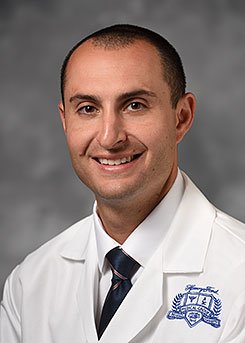Neurological Surgery Residency
The seven year Neurosurgical Residency Training Program offered by the Department of Neurosurgery at Henry Ford Health is designed to prepare residents for a career as surgeons, clinicians, academicians and future leaders in the field of Neurosurgery. The program trains two residents/year.
Residents who successfully complete the residency program are both able and qualified to sit for the oral certification examination offered semi-annually by the American Board of Neurosurgeons and, in their daily practice, reflect the guiding principles upon which their education and surgical training has been built. In order to obtain these goals, the program requires that residents achieve competencies in a broad range of arenas:
- A solid foundation in clinical and basic neurological and neurosurgical disorders and treatment, achieved through reading, clinical experience, didactic education and self-assessment and motivation
- The ability to provide effective clinical judgments and apply the appropriate course of action in the management of patients with neurological and neurosurgical disorders
- Based on an extensive exposure to multiple surgical techniques and problem solving opportunities, the ability to effectively perform basic and advanced neurosurgical procedures with the appropriate skill level
- The capacity for effective interpersonal communication with patients, peers and support staff
- The capacity to deliver compassionate, effective and non-judgmental care to all
- The commitment to excellence and a desire to pursue improvement in patient care practices through constant evaluation of best practices, outcomes and new knowledge
- The ability to analyze practice and perform practice improvement activities as appropriate
- Critical evaluation of the literature and the ability to put this knowledge into practice
- Continued knowledge of the latest and best clinical practices, biomedical, clinical and cognitive sciences and the ability to successfully integrate this into daily patient care related activities
- The capacity to communicate effectively with support staff, patients, families, peers and others
The program is designed to allow the resident multiple opportunities, through clinical exposure to patients in a variety of situations, didactic sessions, reading, and self-assessment to achieve these goals. Additionally, the resident is evaluated by faculty and others on a regular basis to encourage discussion and process improvement during training. Progression through the program is predicated on meeting these and other critical milestones as defined by the ACGME, ABNS and neurosurgical faculty.
Highlights of the neurosurgery service:
- Average daily census of 40 patients on the neurosurgical services
- Approximately 2,100 admissions to the neurosurgical service per year
- More than 3200 operations performed in the neurosurgical operating rooms each year
- More than 19,000 patients seen each year in the outpatient clinic
- Neurosurgery service occupies a 30-bed wing of the hospital, 16-bed NICU, 12 bed neurological/neurosurgical intermediate ICU and a 6 bed epilepsy monitoring unit
- West Bloomfield campus: all subspecialties including functional neurosurgery are offered with over 1400 cases performed yearly
- Standard neurosurgical procedures are performed, with emphasis on both simple and complex neurosurgical procedures
- Specialized areas include: aneurysms, arteriovenous malformations, surgery for cerebrovascular disease, skull base surgery, brain tumors, pituitary tumors, stereotactic surgery for brain tumors, radiosurgery, epilepsy surgery, functional neurosurgery, intracranial endoscopy and disorders of the spine, including degenerative, neoplastic and traumatic cases.
- Residents have extensive exposure to awake and electophysiological mapping as well as cutting edge technologies, including intraoperative MRI, robotic sEEG, robotic spine surgery and laser interstitial thermal therapy (LITT) with experienced faculty
- Surgery and anatomy are taught in a dedicated surgical planning laboratory
- Excellent outpatient clinic experience with diverse Neurosurgical faculty throughout the residency. There are also opportunities for clinic experience with our Physiatry faculty, providing exposure to nonoperative evaluation and management of spinal and peripheral nerve disorders.
Program Leadership



.svg?iar=0&hash=F6049510E33E4E6D8196C26CCC0A64A4)
/hfh-logo-main--white.svg?iar=0&hash=ED491CBFADFB7670FAE94559C98D7798)